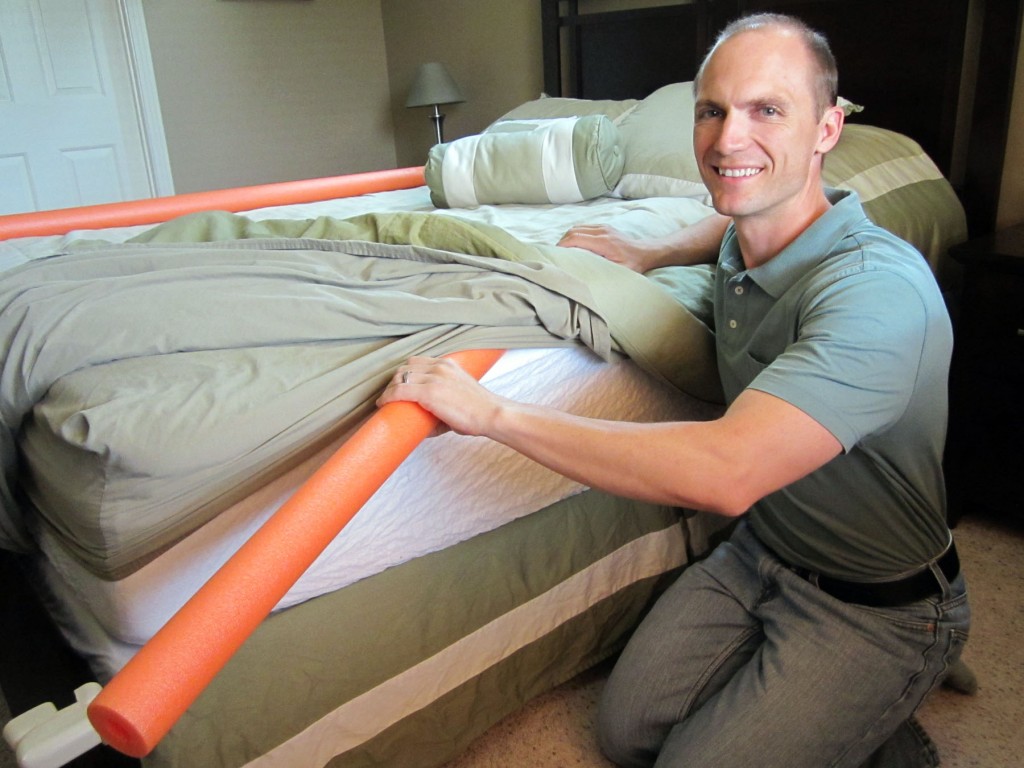QMy mom has fallen out of bed several times recently. She doesn’t know why or what happens, only that she just ends up on the floor. She also has minor dementia, and she needs help when walking. What can I do to help? -Kelly
A. Thanks for your question, Kelly! Falling out of bed may sound like an unusual experience to hear about an older person. It’s often thought of as an issue for young children, but surprisingly and unfortunately, falling out of bed is an issue for older adults as well.
Falling is the number one cause for fracture in the elderly. Many times, a fracture will lead to a cascading decline in mobility and function. Finding methods to limit falling, without restraining or inhibiting important functional mobility, is critical.
The following are reasons why a person may fall out of bed:
- Changes in mobility, such as a recent surgery or stroke.
- Illness: Many illnesses can cause weakness which makes getting in or out of the bed difficult.
- A person has a new bed which is higher or lower than it was previously.
- A person has new bed coverings which are slicker than the previous bedding.
- New night time clothing which are slicker than the old clothing.
- New night time clothing which clings to the bedding and causes increased difficulty with movement on or off the bed.
- New Sleeping Environment: Sleeping on a new bed, on the different side of the bed, different lighting, or changes in nearby furniture.
- Recent medication changes which have affected how deeply a person is sleeping or causes grogginess upon waking.
- Incontinence: If a person has the urge to use the bathroom or needs to rush to the bathroom to prevent an accident, then the risk of falling out of bed increases.
- Sundowners: Many older adults with dementia will suffer from a condition known as sundowners in which fatigue causes increasing confusion at the end of the day.
- Eyesight Related Issues: New corrective wear which isn’t fitting or working properly, such as a new pair of bifocals when the person didn’t wear them previously. Maybe worsening eyesight from conditions such as glaucoma, macular degeneration, or cataracts.
- Benin Paroxysmal Positional Vertigo (BPPV)
- Poor environmental lighting.
One simple trick to prevent a person from falling out of bed (without restraining them or using bed rails) is to use a simple water noodle. Just place the water noodle along the inside of the mattress pad or sheet. (For those with young children, this tip may also be particularly useful if you are transitioning a young child into a bed without railings for the first time.)
Sometimes as a person ages or becomes more confused or frail, we want to discourage them from getting in or out of bed without assistance. This may be an appropriate time to utilize the “water noodle technique” (as I call it). The idea is to simply provide a minor barrier (a reminder) of where the edge of the bed is located and that the person shouldn’t be attempting to get out of bed without calling for assistance.
For some, this minor barrier is all that is needed to actually physically limit his/her ability to get in and out of bed without assistance. This serves as a temporary solution while the person is recovering from or modifying the underlying reason why he/she is at elevated risk of falling out of bed.
The water noodle also provides a subtle physiological barrier. When the body is moving, it subconsciously feels the barrier and tends to not proceed any further in that direction. I have witnessed the water noodle technique work repeatedly in homes (with both adults and children) and nursing homes with great success.
Kelly also mentions that her mother is having difficulty with dementia and walking. Unless the mother’s dementia is so severe (like she is actually losing her ability to walk or she can’t follow any time of direction), she may be a good candidate for physical therapy treatment. Depending on the situation, she may benefit by going to an outpatient facility for physical therapy or she may qualify for home health physical therapy. I strongly encourage you to seek a physical therapist who is an expert with gait (walking) and balance physical therapy or who had experience in geriatric related physical therapy care. You can search for specific providers here: American Physical Therapy Association (APTA)
In addition, Kelly, you may be interested in reviewing my prior posts on balance related issues, How Do I Improve Balance? (Part I) and How Do I Improve Balance? Part II. Good luck, and thank you for your question.
Join our growing community on Facebook by liking The Physical Therapy Advisor! If you have a question that you would like featured in an upcoming blog post, please e-mail contact@thephysicaltherapyadvisor.com.

